13 Strong Polish Books You Must Read
This post may contain affiliate links that earn us a commission at no extra cost to you.
Read the best Polish books and meet Polish authors to teach you more and take you around the world.
Learn more about Poland with these Polish books and Polish literature – fiction and nonfiction.
Explore true-life accounts of World War 2, and delve deeper into politics. Gather insight from generations of family members as well as villagers and residents of a sanatorium.
Meet award-winning Polish authors who examine the true meaning of life, relationships, and religion.
Then, uncover the best Polish novels with science-fiction and supernational elements. Watch witches at work, and survive in a post-apocalyptic world.
So, what are the best Polish books to read right now? Which books set in Poland will take you there?
Be sure to tell us your must-reads in the comments. Let’s get started!
Read even more books about Poland.

Grab the best Polish novels here:
- Audible Plus: From Amazon, listen to Amazon Originals, podcasts, and audiobooks. They add new titles every week.
- Book of the Month: Get the month’s hottest new and upcoming titles from Book of the Month. You might snag an early release or debut author. Along with selecting a book a month, find terrific add-ons, both trendy and lesser-known titles.
- Amazon Prime Video – Stream thousands of ad-free movies and TV series on demand with Prime Video.
13 Best Polish Books
By Dagney McKinney
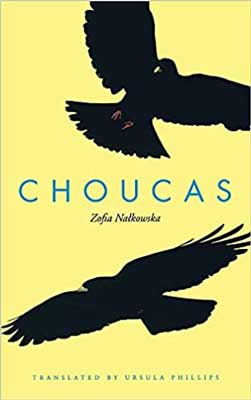
1. Choucas by Zofia Nałkowska
Translated in English by Ursula Phillips
Set in a sanatorium in the Swiss Alps in the 1920s, this Polish book’s title comes from a French word for a type of bird that’s native to Switzerland.
The story features a number of characters with a vast spectrum of nationalities and religious and philosophical beliefs.
The narrator is a Polish woman, who describes the inhabitants of the sanatorium and their visitors in great detail.
Each one has a distinct and separate political or religious point of view, and each has their own sense of nationalism.
Much like the Choucas of the title, who swoop down from the mountains looking for food, the characters travel through the corridors of the sanatorium, looking for answers and truths about the nature of being.
Details of the novel are strongly believed to be at least partially based on author Zofia Nałkowska’s real-life experiences staying in a sanatorium in Leysin, Switzerland at the time the novel is set.
Check out more books set in Switzerland here.
Read Choucas: Amazon | Goodreads
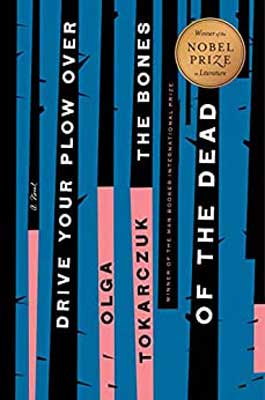
2. Drive Your Plow Over the Bones of the Dead by Olga Tokarczuk
Translated into English by Antonia Lloyd-Jones
A rural Polish village becomes the setting of a crime scene when the elderly and reclusive Janina discovers the body of one of her neighbors one winter.
The dead man, known as Big Foot, appears to have accidentally choked on a bone while eating.
But Janina believes there could be other powers at play. As a student of astrology and nature, she thinks that perhaps the animals that Big Foot was known to hunt have somehow risen up and killed him.
The police don’t believe her, of course.
But when more bodies start to turn up in unusual circumstances, Janina puts herself at the heart of the investigation. The murderer must be found!
Drive Your Plow… is one of the more amusing and darkly comic Polish books on this list.
Janina makes for an interesting narrator, and the atmosphere of the setting – a small town of empty holiday homes in the off-season – is both vividly and evocatively written.
Olga Tokarczuk is one of the most celebrated contemporary Polish authors and has written multiple highly acclaimed books about Poland.
Uncover even more winter reads.
Read Drive Your Plow Over the Bones of the Dead: Amazon | Goodreads
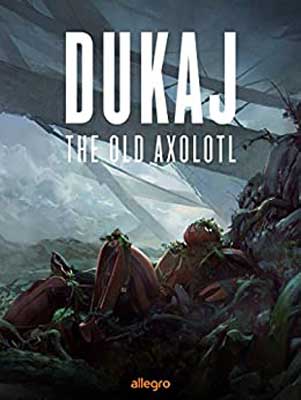
3. The Old Axolotl: Hardware Dreams by Jacek Dukaj
Translated in English by Stanley Bill
In order to escape an apocalyptic event, a small number of people manage to download their consciousnesses into machines, barely avoiding annihilation by the skin of their no-longer-existent teeth.
Now, they find themselves on an Earth that has been completely sterilized and stripped of all living things.
They are without the bodies they are used to; instead, they find themselves inside industrial robots, sophisticated computer systems, and even sex robots from east Asia.
As they begin to replicate their old organic lives and begin the difficult process of forming civilizations, they also start to wonder just how human they are now, if at all.
Author Jacek Dukaj’s cyberpunk novel was released exclusively digitally, in keeping with the nature of its content.
The copies include electronic-only aspects such as hypertext and 3-D printable models of the characters.
Like an increasing number of Polish novels, it also served as inspiration for a great piece of media – in this case, one of my favorite post-apocalyptic tv series, Into the Night.
Although fair warning, the source material shares little in common with the TV show!
Read The Old Axolotl: Amazon | Goodreads
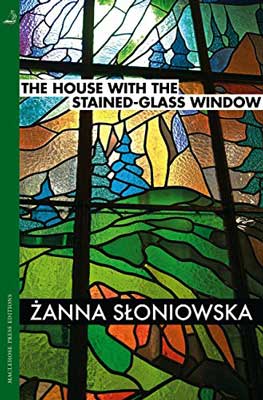
4. The House with the Stained-Glass Window by Żanna Słoniowska
Translated into English by Antonia Lloyd-Jones
Four generations of women, one house with a large stained-glass window, in which our plot begins.
Centered around the unnamed narrator of the novel, we are given her account of an affair she had with an older, married man.
While they embark on their relationship, the man, Mykola, tells the narrator about her mother Marianna.
Marianna was an opera singer and Ukrainian nationalist who was shot dead when the narrator was 11 years old.
From this, we are thrown back into the past to examine the narrator’s own memories of her mother, her grandmother, and her great-grandmother.
As we are taken from one point in time to another, sometimes as one chapter ends and another begins, the parallels between the lives of the different generations of women become clearer and clearer.
This lyrical and poetic story of the artistic and political coming-of-age of the protagonist is one of the best Polish books you can find.
It’s also one of the best books about Ukraine.
Read The House with the Stained-Glass Window: Amazon | Goodreads
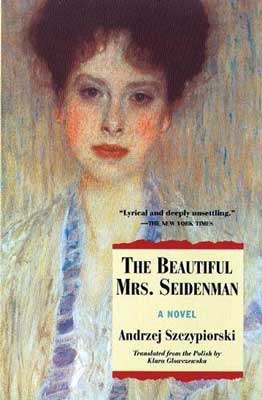
5. The Beautiful Mrs. Seidenman by Andrzej Szczypiorski
Translated into English by Klara Glowczewska
Under the brutal control of the Nazis in 1943, the Jewish population of Warsaw has seemingly no hope of escape.
Fortunately for the widowed Irma Seidenman, she has two things that might be the key to her escape: her blonde hair and her blue eyes.
Having snuck out of the ghetto by posing as the wife of a Polish officer, she is spotted by an informer and taken to the Gestapo.
In the few hours she may have left to live, the imprisoned Mrs. Seidenman recalls the lives of those who have helped her in her life, as the chance of rescue becomes increasingly remote.
Contrary to what you might think from the title, author Andrzej Szczypiorski’s novel does not entirely revolve around the eponymous Mrs. Seidenman.
Through her recollections, the other members of the Warsaw Jewish community – a smuggled child, a crusading nun, an affluent tailor – each get evocative treatment, creating a literary collage of lives for the reader.
Explore more books about WW2.
Read The Beautiful Mrs. Seidenman: Amazon | Goodreads
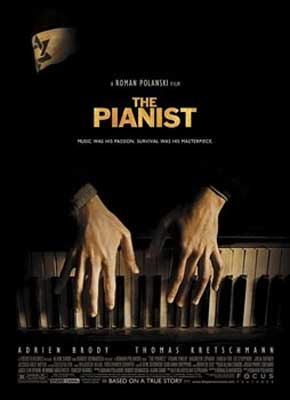
6. The Pianist: The Extraordinary True Story of One Man’s Survival in Warsaw by Władysław Szpilman
Translated into English by Anthea Bell
The events depicted in this memoir are so extreme that they’re almost unbelievable. But that is the nature of the Holocaust.
As the Nazis take over Warsaw during WWII, pianist Władysław Szpilman and his family are among the Jews forced into the claustrophobic ghettos.
Unlike the rest of his family, who were deported and exterminated, Szpilman is saved at the last moment by a policeman who recognizes him.
Now on his own and very much behind enemy lines, Szpilman hides wherever he can in order to avoid certain death if he is discovered.
But when he finds himself in the presence of a German officer, his skill and passion for music keep him alive.
Written immediately following the end of WWII, this most emotional and incredible of Polish books has been adapted into the harrowing movie The Pianist, one of the most powerful Polish movies ever made.
Read The Pianist: Amazon | Goodreads
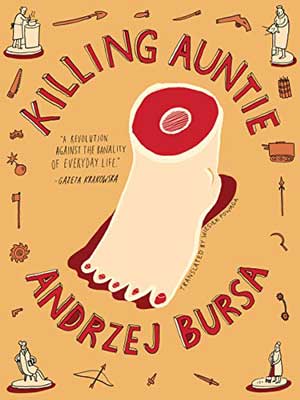
7. Killing Auntie by Andrzej Bursa
Translated in English by Wiesiek Powaga
With its witty prose and dark sense of humor, Killing Auntie asks one of the oldest questions related to murder in fiction: what do you do with the body?
Having killed his doting aunt seemingly on a whim after she asks him to complete a small chore, young student Jurek now needs to dispose of the evidence.
As you can imagine, it does not go as smoothly as he might hope.
In fact, getting rid of his aunt proves even more eventful than Jurek could have imagined, as he meets a girl on a train who might just be the love of his life.
But she might be put off if she discovers his recent crime. Probably best not to tell her. Right?
As the only novel from the tragically short-lived cult author Wiesiek Powaga, Killing Auntie stands as one of the best Polish books of the 20th century.
Read Killing Auntie: Amazon | Goodreads
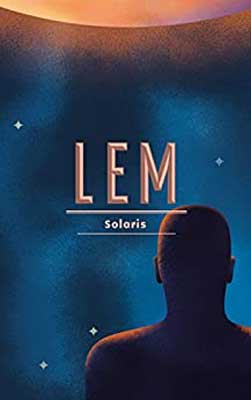
8. Solaris by Stanisław Lem
Translated into English by Joanna Kilmartin and Steve Cox
On the distant planet of Solaris, scientists have been trying to communicate with an alien life-form that lives on the surface.
The life-form appears to be an immense, planet-covering being not unlike an ocean, and scientists have been trying and failing to talk to it for years.
Arriving on Solaris Station, which floats above the surface of the planet, psychologist Kris Kelvin intends to study the life-form for himself.
But Dr. Kelvin begins to be plagued by bad memories, which appear as real-life, flesh-and-blood people.
The rest of the crew are experiencing similar situations, and Dr. Kelvin is going to find out that understanding an alien is nowhere near as difficult as understanding yourself.
Solaris is a classic of science fiction, and one of the greatest Polish books in the genre. Author Stanisław Lem’s novel does what all good sci-fi should do: make us question what it means to be human.
Read Solaris: Amazon | Goodreads
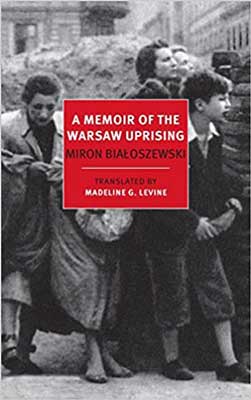
9. A Memoir of the Warsaw Uprising by Miron Białoszewski
Translated in English by Madeline G. Levine
On August 1st, 1944, one of the most infamous uprisings of WWII began as the residents of Warsaw fought for their freedom from the Nazis.
Unfortunately, the uprising was a roaring failure, resulting in the deaths of nearly 200,000 Varsovians and the near-total destruction of Warsaw.
With the odds stacked heavily against them, the uprising ended after only two months.
Written by Miron Białoszewski, one of the survivors of both the war and said uprising, this memoir recounts his own story and life during the uprising.
A Memoir of the Warsaw Uprising is considered one of the most important Polish books of the 20th century due to the essential insight it gives into this horrifying time period.
Read A Memoir of the Warsaw Uprising: Amazon | Goodreads
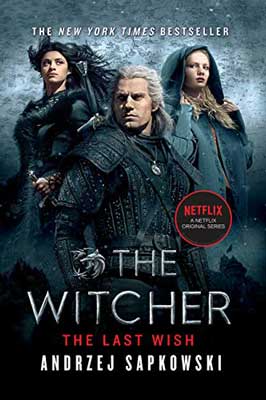
10. The Witcher series by Andrzej Sapkowski
Translated in English by Danusia Stok
This series of fantasy novels and short stories has a cult following in its native Poland and in many other European countries.
They follow the exploits of Geralt of Rivia – a “witcher” who, like the others of his kind, developed supernatural abilities in order to fight and defeat the magical monsters that plague the land.
Like many creative properties to be given the Western TV Treatment, it’s understandable if not many people know that the Witcher TV series was originally based on Polish books.
Fortunately for this list, they are the brainchild of Polish author Andrzej Sapkowski, who originally conceived them for a short story competition held by one of his son’s favorite sci-fi and fantasy magazines.
Sapkowski submitted the first Witcher story – capped at 30 pages for the competition – to the magazine, and they gave it third place. But the public demanded more, and the rest is history.
Apart from the publication date, the best way to read the Witcher series is to start with The Last Wish.
If you enjoy supernational stories, don’t miss our wickedly witchy reading list.
Read The Last Wish: Amazon | Goodreads
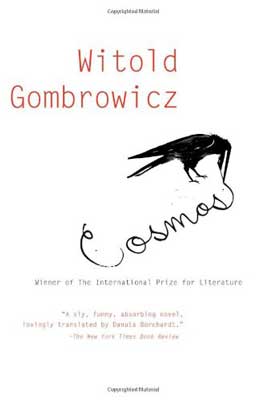
11. Cosmos by Witold Gombrowicz
Translated into English by Danuta Borchardt
While traveling in the Carpathian Mountains, the unpleasant yet charismatic Witold comes across Fuks.
Fuks is another young man looking for solitude and relaxation in the country, having fled from his tyrannical boss.
As the two journey together, they come across a dead bird hanging from a string.
While this in itself is unusual, the two become paranoid that the bird is the start of a series of unpleasant and ominous events.
Finding themselves at a family-run boarding house, Witold and Fuks attempt to find patterns wherever they can in an attempt to understand their situation.
Can they get ahead of whatever malevolent force may or may not be working against them?
This Kafkaesque examination of meaning and sanity was the winner of the International Prize for Literature in 1967.
Author Witold Gombrowicz mixes wordplay, noir tropes, and some amount of detective fiction to create one of the most intriguing Polish novels on this list.
Read Cosmos: Amazon | Goodreads
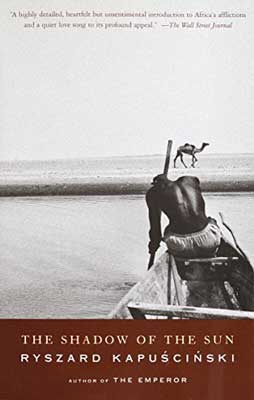
12. The Shadow of the Sun by Ryszard Kapuściński
Translated into English by Klara Glowczewska
Ryszard Kapuściński was a Polish journalist, photographer, and one of the most famous travel writers of the 20th century. The Shadow of the Sun is one of his most acclaimed works.
Kapuściński spent nearly 30 years living and traveling in Africa writing about colonialism and politics. His first book, Another Day of Life, about Angola, earned him international recognition.
Due to this extensive experience, in 1957 he was sent to cover the end of colonial rule for the Polish Press Agency.
Published in 1998, The Shadow of the Sun is a culmination of his years as a correspondent in Africa.
The book details the end of colonialism throughout the continent but focuses on a few countries he knew best, including Ghana, Ethiopia, Tanzania, Uganda, and Rwanda.
Discover more books set in Africa.
Read The Shadow of the Sun: Amazon | Goodreads
More Polish books from Christine:
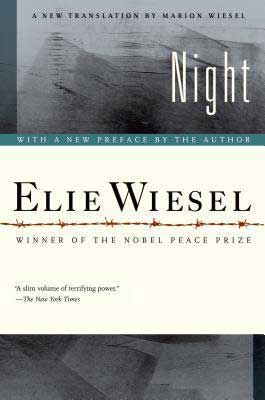
13. Night by Elie Wiesel
Translated into English by Marion Wiesel
One of the most widely read WW2 books for teens, Night is the autobiographical account of surviving the Nazi concentration camps.
At the age of 15, the Nazis capture Ellie Wiesel and his family, taking them to Auschwitz and later Buchenwald. Less than half of them will survive.
The newer translation from Wiesel’s wife, Marion, examines survivors’ guilt and reminds us that we cannot let this happen again.
For sad stories that teach us more, this is one of the must-read Polish books.
Read Night: Amazon | Goodreads
Save These Polish Novels & Nonfiction Books For Later:
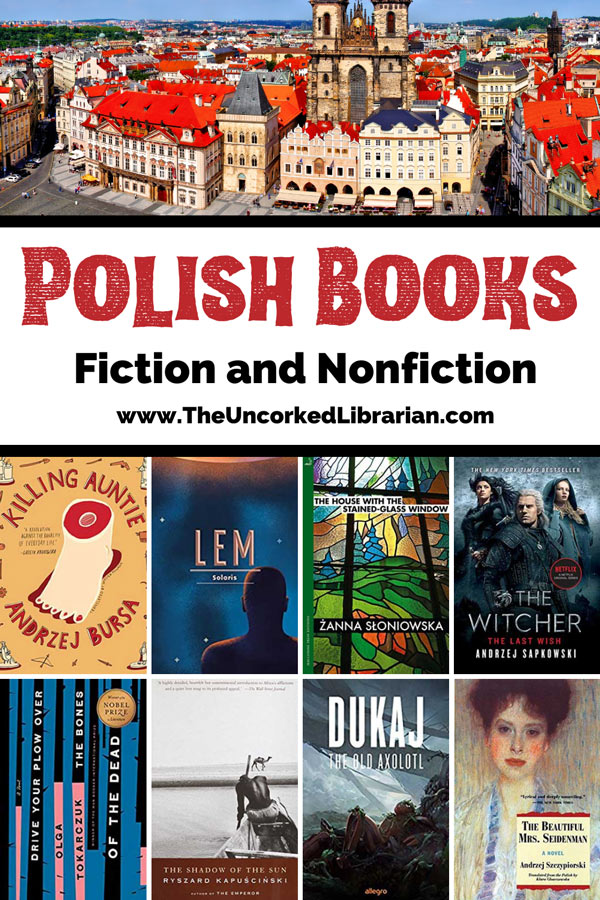
Grab your favorite Polish books here:
- Audible Plus: From Amazon, listen to Amazon Originals, podcasts, and audiobooks. They add new titles every week.
- Book of the Month: Get the month’s hottest new and upcoming titles from Book of the Month. You might snag an early release or debut author. Along with selecting a book a month, find terrific add-ons, both trendy and lesser-known titles.
- Amazon Prime Video – Stream thousands of ad-free movies and TV series on demand with Prime Video.
Thank you to TUL contributor, Dagney McKinney

Dagney (pronouns: any) is a neurodivergent writer who loves all things macabre and weird. She likes outrageously spicy food, long walks through graveyards, and historical tangents. You’ll most likely find her wandering around somewhere quiet or underground, buying salt, or whispering to camels.
Who are your favorite Polish authors?
What are the best Polish novels and literature you’ve read? Do you have favorite Polish authors? Let us know in the comments.
You May Also Enjoy:
Top Polish Movies
Baltic Books
